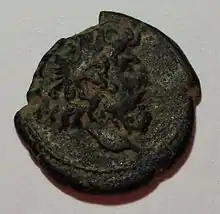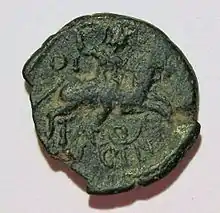Isinda (Pisidia)
Isinda (Ancient Greek: Ἴσινδα) was a town of ancient Pisidia.


Its site is located near Korkuteli, Asiatic Turkey.[1][2] More precisely, the site is now thought to be at the village of Kişla, though formerly identified with Yazır.[3] In the 1840s, Thomas Abel Brimage Spratt and Edward Forbes visited Kişla, an hour's ride from Korkuteli (referred to as Stenez), with extensive walls of soft stone and burnt brick, and identified it as the city of Isinda, which the Roman consul Gnaeus Manlius Vulso, on his victorious march through Asia Minor in 189 BCE, found besieged by Termessus. At the city's request he raised the siege and fined the Termessians 50 talents.[3][4]
Isinda stood in a strategic position at the western end of the pass leading from Pamphylia by Termessus to Pisidia.[5] Samples of the extensive[5] coinage of Isinda are extant, which give evidence that it considered itself an Ionian colony.[3]
Isinda was later included in the Roman province of Pamphylia Secunda. At an early stage, it became a Christian bishopric, a suffragan of the metropolitan see of Perge, the capital of the province. Of its bishops, Cyrillus took part in the First Council of Nicaea in 325, Edesius in the Council of Ephesus in 431, Marcellinus in the Council of Chalcedon in 451, Talleleus in the Second Council of Constantinople in 553, Ignatius in the Photian Council of Constantinople (879).[6][7][8]
No longer a residential bishopric, Isinda is now listed by the Catholic Church as a titular see.[9]
References
- Richard Talbert, ed. (2000). Barrington Atlas of the Greek and Roman World. Princeton University Press. p. 65, and directory notes accompanying.
- Lund University. Digital Atlas of the Roman Empire.
- G.E. Bean, "Isinda (Kişla) Turkey" in The Princeton Encyclopedia of Classical Sites (Princeton University Press 1976)
- T.A.B. Spratt and E. Forbes, Travels in Lycia, Milyas, and the Cibyratis (van Voorst, 1847), pp. 246–247
- Mittheilungen des Deutschen Archaeologischen Institutes in Athen (1885), reprinted by London: Forgotten Books, 2013, p. 339–340
- Michel Lequien, Oriens christianus in quatuor Patriarchatus digestus, Paris 1740, Vol. I, coll. 1033-1034
- Pius Bonifacius Gams, Series episcoporum Ecclesiae Catholicae, Leipzig 1931, p. 451
- Siméon Vailhé, v. Isionda, Catholic Encyclopedia, vol. VIII, New York 1910
- Annuario Pontificio 2013 (Libreria Editrice Vaticana 2013 ISBN 978-88-209-9070-1), p. 910